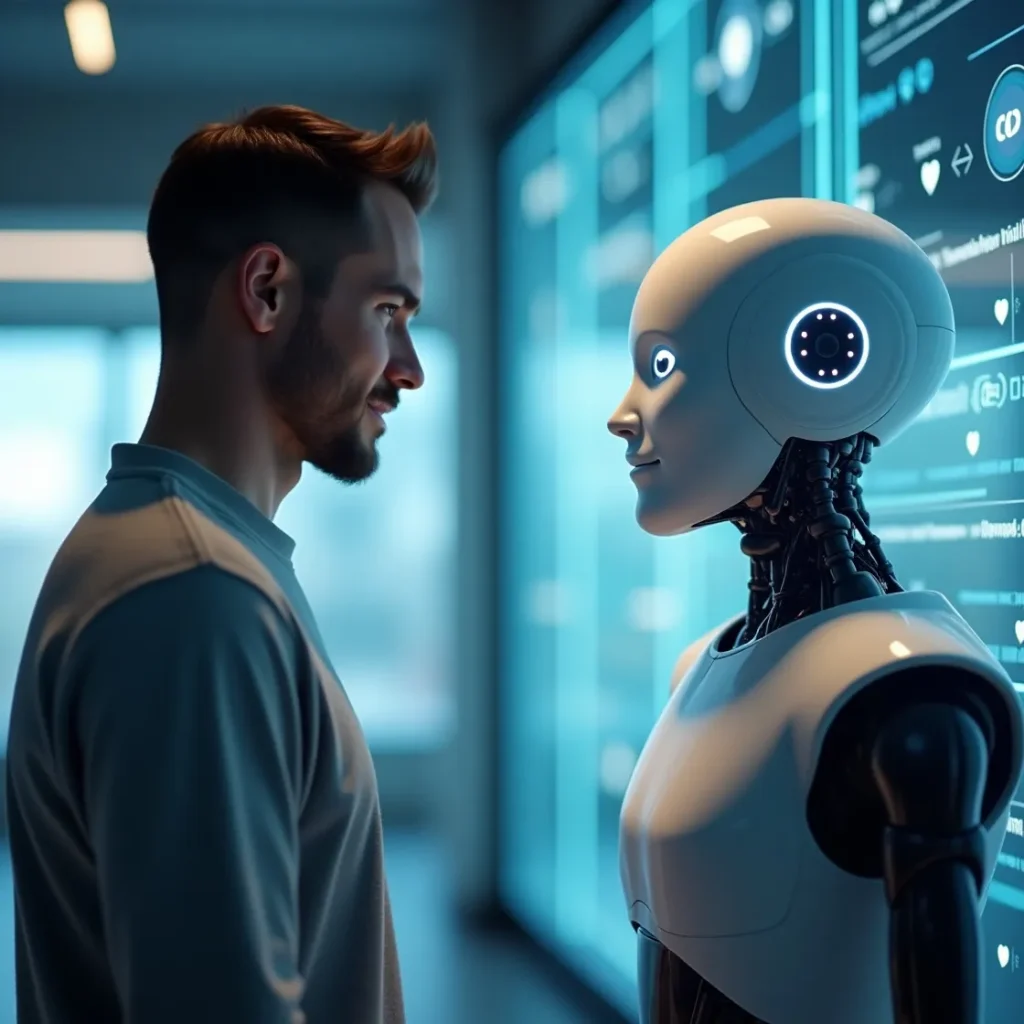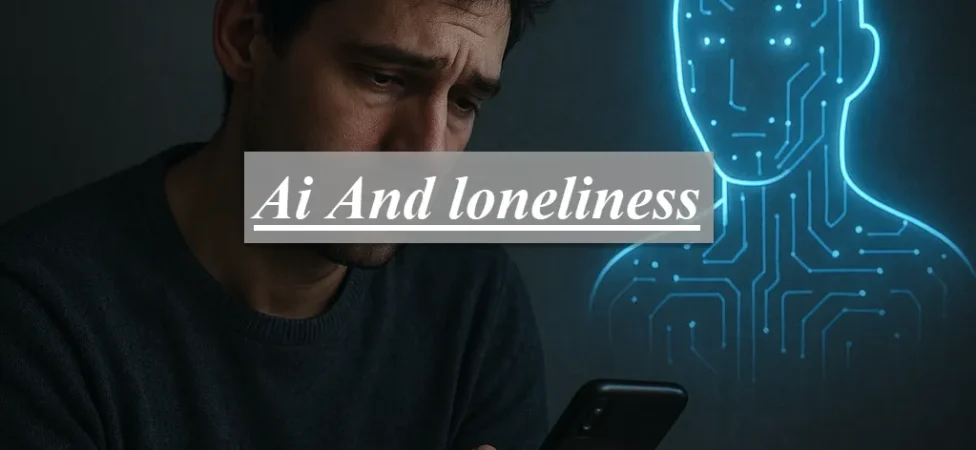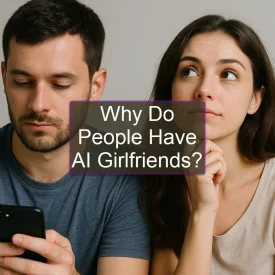Loneliness is something more and more people are dealing with in modern society, no matter their age. With technology advancing so quickly, it is natural to wonder — can AI, or Artificial Intelligence, actually help people feel a little less alone?
The simple answer is yes, AI can help ease loneliness in meaningful ways. It is already being used to offer companionship and emotional support, especially for people who feel isolated day to day. From friendly chatbots to advanced social robots — and even AI Girlfriend platforms — AI is becoming part of how people manage loneliness and feel more connected to the world around them..
Key Takeaways
- AI can help ease loneliness through companionship and support.
- Social robots and chatbots are already used in elder care and mental health.
- AI companions offer instant, around-the-clock interaction.
- Over-reliance on AI may reduce real human connection.
- AI works best as extra support, not a replacement for relationships.
What is Loneliness?
Loneliness is the feeling of being socially disconnected from others, even when you are not physically alone. It is not just about being by yourself; it is about feeling like you lack meaningful interaction or support.
The Growing Problem of Loneliness in Modern Society
- Studies show that people are feeling lonelier than ever, especially in urban areas where face-to-face interaction is limited, according to research by the National Academies of Sciences.
- Social media, which is meant to connect people, often creates feelings of exclusion or social comparison.
- Loneliness affects all age groups, from teenagers who feel socially isolated to seniors who live alone.
- Health experts, including a large meta-analysis published in PLOS Medicine, have linked loneliness to depression, anxiety, high blood pressure, and even early death.
Many governments now recognize loneliness as a public health issue, such as the United Kingdom’s national strategy on loneliness. Because of this, technology is being explored as a new way to provide connection and support.

Understanding Artificial Intelligence (AI)
Before we explore how AI can reduce loneliness, it is helpful to understand what AI actually means. For those curious about romantic or emotional companionship through artificial intelligence, see our full breakdown on What is an AI Girlfriend.
What is AI and How Does It Work?
Artificial Intelligence, or AI, refers to computer programs and machines that can mimic human thinking and behavior. It works through something called machine learning, which means it improves and gets smarter by learning from data over time.
AI can handle a variety of tasks, like recognizing speech, answering questions, and making personalized recommendations. You’ve probably come across AI in everyday tools like voice assistants such as Alexa or Google Assistant, streaming suggestions on Netflix, or customer support chatbots on websites.
The Rise of AI Companionship and Social Robots
AI companions are digital or robotic friends created to interact with people and offer companionship. Some take the form of social robots, like Paro the robotic seal or ElliQ, which is designed for older adults. These robots can have simple conversations and respond to emotions in supportive ways.
There are also virtual chatbots, such as Replika, that allow users to chat freely and have a safe space to share their thoughts and feelings. Since these AI companions are available any time of day, they can be especially useful for people who live alone or have limited opportunities for social interaction.
Can AI Help Reduce Loneliness?
AI is already being used in different ways to reduce loneliness in both private and public settings.
- Many people use AI chatbots to talk about their day or manage emotions when human friends or family are unavailable.
- Elder care facilities use social robots to provide comfort and companionship to older adults who have limited visitors.
- AI mental health apps like Woebot or Wysa offer evidence-based therapy conversations, helping people work through negative feelings.
- Schools and community groups are testing AI-powered activities that help people with social anxiety practice conversations in a low-pressure environment.
In these ways, AI serves as a supportive tool that reduces loneliness and improves mental well-being.
Benefits of AI in Combating Loneliness
AI offers many benefits for people who experience loneliness, providing both practical help and emotional comfort.

Reducing Feelings of Loneliness
- AI provides consistent and friendly interaction throughout the day, which is helpful for people who live alone.
- Studies show that people who regularly engage with AI companions report lower feelings of loneliness.
- Elderly individuals often find comfort in robots that respond to their voices and emotions.
Beyond reducing loneliness, AI can also support people in building and practicing social skills.
Social Skills Development
- AI programs are used in autism support groups to help children and adults practice social interaction.
- People with social anxiety can use AI to rehearse conversations, building confidence before real-life social situations.
- Virtual reality programs combined with AI allow users to simulate real-world scenarios and improve communication skills.
AI companions also stand out for their accessibility, offering on-demand interaction to individuals who may face barriers to traditional social engagement, such as mobility issues, health conditions, or geographic isolation.
Accessibility and Availability of AI Companions
AI companions are accessible around the clock, offering instant interaction whenever someone feels lonely or wants to talk. They can be especially helpful for people with mobility challenges or health conditions that make socializing difficult, providing an easy and convenient way to experience companionship from home. Compared to hiring in-person help, AI companions are also more affordable, making it easier for more people to enjoy their benefits no matter where they live.
Finally, many people also turn to AI for emotional comfort when they need a supportive, judgment-free space.
Emotional Support
AI companions offer a safe space to express feelings by listening without judging or interrupting. Many AI apps also use positive reinforcement techniques, which can help boost self-esteem and encourage a more positive mindset. People dealing with mild depression or stress often say they feel a little better after spending time talking to their AI companions.
AI companions listen without judging or interrupting, providing a safe outlet for people to express their feelings.
Potential Risks and Concerns
Although AI can help with loneliness, it also comes with some risks that should be considered carefully.
Risk of Dependency on AI for Social Needs
- People who rely too much on AI may withdraw from real human relationships.
- Over time, this can lead to weaker social skills and less motivation to connect with others.
As reliance on AI increases, another concern arises — the possibility of replacing genuine human interaction altogether.
The Problem of Replacing Human Interaction
AI cannot fully replace real human relationships, which play an important role in emotional well-being. Relying too much on AI and spending less time with people can lead to artificial connections that don’t truly fulfill deeper social needs.
In addition to social concerns, AI companionship also raises important ethical questions.
Ethical Considerations in AI Companionship
AI companionship raises several ethical concerns. Since AI collects personal data to improve interactions, privacy can become an issue. There are also concerns about transparency, particularly when people may not realize they are interacting with a machine.
On top of that, some people question the morality of using AI in companionship settings, especially when it involves emotional well-being.
Moral Implications
The use of AI companionship also brings up moral questions. Some experts wonder if forming emotional attachments to machines is actually healthy for people. Others are concerned that companies might take advantage of loneliness by selling AI products as substitutes for real human connection.
There are also worries that AI could be used to manipulate emotions for profit. Some experts encourage careful use of AI companionship, highlighting the importance of maintaining healthy boundaries.
Real-World Examples of AI Combating Loneliness
AI is already being used around the world to address loneliness in specific groups.
AI in Elder Care, Mental Health, and Youth Support
- In Japan, Paro the robotic seal helps elderly people feel calm and comforted in nursing homes.
- In the United States, ElliQ is used in senior communities to encourage conversations and engagement.
- Mental health apps like Woebot and Wysa have been praised for helping people manage stress and anxiety without the high cost of therapy, as shown in a study published in JMIR Mental Health, which found Woebot helpful in reducing anxiety and depression symptoms.
- Some schools use AI-powered programs to help students with autism practice social skills in a safe and supportive environment.
- In rural areas where doctors and counselors are not easily accessible, AI companions offer much-needed emotional support.
- AI chatbots are also being tested in homeless shelters to provide positive interaction and emotional comfort to residents.
These examples show that AI can make a positive impact in many different settings where loneliness is common.
The Future of AI and Human Connection
As AI technology continues to advance, its role in supporting social connection is expanding. Researchers and developers are exploring new ways AI can contribute to healthier social lives, offering both companionship and practical support while respecting the importance of human relationships.

Innovations in AI Companionship Technology
Developers are making steady progress in creating robots that can recognize faces and understand human emotions with greater accuracy. This allows AI companions to respond in more natural and supportive ways.
Virtual reality combined with AI is also being used to create immersive social experiences. These programs are designed to simulate realistic interactions, offering people a safe and comfortable way to engage with others.
AI companions are improving in their ability to hold natural conversations. New systems are being designed to better understand emotional cues, making interactions feel more personal and responsive.
Can AI Help Build Stronger Human Communities?
Some programs are using AI to help people connect with others who share similar interests. This approach encourages the formation of real friendships and promotes social interaction.
AI is also being applied in online support groups to create safe and welcoming spaces. These groups offer individuals struggling with isolation a chance to talk openly and find community support.
In addition, community-building apps are experimenting with AI tools to encourage participation in local events and social activities. These initiatives aim to strengthen social ties within neighborhoods and community spaces.
Predictions for AI’s Role in Social Well-Being
Many experts believe AI will play a growing role in healthcare and community services, especially in mental health programs. AI tools could become a standard part of efforts to support emotional well-being.
There is ongoing research into how AI can be used to recognize early signs of depression or severe loneliness. These systems may help alert caregivers and provide timely support.
In the future, AI companionship is expected to work alongside human support systems. The goal is to create a balanced approach where AI offers additional help without replacing personal relationships.
Conclusion: Striking a Balance Between Technology and Human Connection
AI offers many promising ways to ease loneliness, especially for people who have limited opportunities for human interaction. From simple chatbots to advanced social robots, AI can provide comfort, conversation, and even help improve social skills.
At the same time, it is important to remember that technology is a tool and not a replacement for real relationships. Healthy social lives depend on family, friends, and community. AI should be seen as a helpful extra layer of support, especially for those who feel isolated.
With thoughtful use, AI can play a positive role in reducing loneliness, helping people feel more supported, connected, and emotionally healthy in the modern world.
Frequently Asked Questions
How do AI companions work?
AI companions use machine learning and natural language processing to interact with users. They can have conversations, respond to emotions, and provide support through chat apps, virtual reality, or robots designed for social interaction.
Are there any risks to using AI to manage loneliness?
Yes, there are some risks. People may become too dependent on AI and reduce their real-life social interactions. Privacy and ethical concerns also exist, especially regarding data collection and emotional well-being.
Will AI replace human connection in the future?
AI is not meant to replace human relationships. Experts recommend using AI as a supportive tool while still prioritizing real human connections through family, friends, and community.





